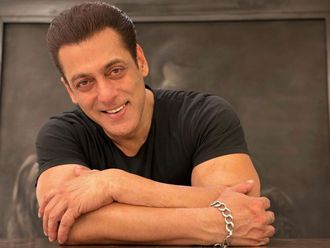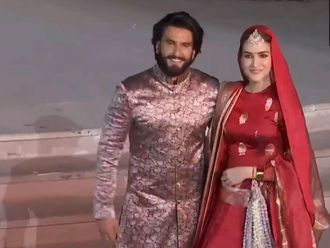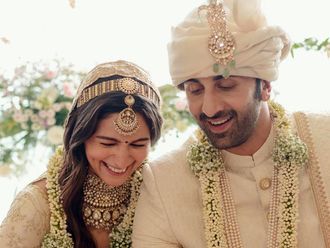
Indian-American beauty queen and entrepreneur Nina Davuluri made history when she became the first contestant of Indian origin to win the Miss America title in 2013. Almost instantly, a barrage of racist comments began to pour in. She was too Indian for some of her fellow Americans, too dark-skinned for some of her fellow Indians. Enough was enough, Davuluri felt, and took matters into her own hands — she founded a skincare line to combat the negative beauty standards she grew up with, and began to speak out on the importance of meaningful inclusion.
Her motivational speeches have taken her from India to the UK, from Harvard to Princeton. On November 14, she will speak in Dubai as part of the Global WIL (Women in Leadership) Economic Forum 2018. But first, the 29-year-old tells Gulf News tabloid! why the world still needs to change — and what she’s doing to change it.
When you were crowned Miss America 2014, two things happened: you made history, and you were the target of racist backlash on social media. How do you look back on that reaction, nearly five years later?
I was so proud to represent my culture and heritage on a platform like Miss America. Although I received a lot of xenophobic comments, I also received a lot of support and words of encouragement. Through that, I was able to launch my social media campaign internationally, #CirclesOfUnity, to encourage constructive and civil dialogue on diversity issues. I ask everyone to share representative thoughts and stories about their experiences on how we can globally advance cultural awareness.
What do you think the reaction would have been if you had won the title in 2018?
Unfortunately, I think it would have been somewhat similar. I think my platform is so much more relevant now than ever before. That being said, we’re now in the midst of a movement of young people standing up and fighting for what they believe in.
As someone who’s been a victim of its crueller side, what are your feelings toward social media and the way it’s used?
Social media is a wonderful resource. We are connected globally through our fingertips and when used appropriately [it] can create positive discussions and movements. I think it’s incredibly important for us to be teaching healthy social media habits and also practicing them, as well. Because of the prevalence of bullying happening in schools, I helped launch ‘Act to Change’, an anti-bullying programme through the White House Initiative on Asian Americans.
Becoming Miss America was no easy feat and I certainly wasn’t going to have anyone’s opinion of my skin colour dictate my success, beauty, or intelligence
Tell us about your talk at the Global WIL Economic Forum. What does it entail?
Growing up in rural Oklahoma and Michigan, I realised I was culturally different; I wasn’t part of the stereotypical ‘American family’. I was the only person of Indian origin in my classes… I often found myself in conversations with classmates, correcting stereotypes and media images. My talk primarily focuses on my experiences growing up as a second-generation Asian American. ‘Celebrating Diversity through Cultural Competency’ is intended to spark a conversation about diversity, inclusion, and assimilation.
Who were some of the women you looked up to growing up?
I’m lucky to come from a family of strong women who have always emphasised the importance of education. I’m especially inspired by my grandmother who acquired a small elementary school in India during the 1950s and over 60 years later, she’s turned that elementary school into a degree-granting college and university. Unfortunately, millions of girls around the world face barriers that prevent them from attending school that boys simply do not.
There’s been more prominent and visible crossovers these days between Bollywood and Hollywood, from Priyanka Chopra starring in Quantico to Deepika Padukone in the xXx franchise with Vin Diesel. What do you make of it?
I think it’s amazing. It’s also incredible to see so many other South Asians Americans also entering creative industries. It’s an exciting time for us.
You’ve always been outspoken around issues of cultural competency. Can you explain what that term means to you?
Celebrating everyone’s unique individuality. We’re standing at a time where industries are finally recognising and understanding the strength and value in diversity. It’s not simply an afterthought, it’s something that’s shifting to be the expectation. Diversity and representation is so much more than seeing a picture of someone who looks similar to you. I think true representation comes from understanding cultures — and more importantly, [celebrating them].
You launched your skincare line aavrani as a response to colourism in India’s beauty industry; for instance, the prevalence of face whitening products. Do you think there has been, or will ever be a shift in the way skin colour is viewed in India?
Growing up, I found myself influenced by the traditional notions of beauty standards in our culture. Although I was born and raised in the US, the notion of ‘fair skin’ is still pervasive among many Asian countries. From the time I was in elementary school, I experienced comments like, ‘Don’t go out in the sun, you’re going to get too dark,’ or ‘You would be so much prettier if you were lighter.’ In college, my then (Indian) boyfriend, told me his mother would think I was ‘too dark’ if I met her. Unfortunately, the list goes on. The morning after I won Miss America, I remember reading international headlines saying ‘Is Miss America too dark to be Miss India?’ I decided enough was enough. Why are we so quick to bring down women who have achieved any form of success by targeting their physical appearance? Becoming Miss America was no easy feat and I certainly wasn’t going to have anyone’s opinion of my skin colour dictate my success, beauty, or intelligence. Using my platform for the past four years, I’ve spoken openly against the skin lightening industry… Creating aavrani was so much more than just skincare for me — it’s who I am, what I believe in, and everything I stand for.
What does a day off for Nina Davuluri look like?
Brunching outdoors with friends and a long walk in Central Park with my little rescue pup, Dobby.
What’s your message or hope for America today?
Resilience and action. From this last election, we’ve seen young people mobilise and use their voices. It’s so important that we educate ourselves.
Finally, what are you working on right now?
Growing aavrani and of course continuing my speaking tour and work in the hosting arena. Every day is so different and I wouldn’t have it any other way.
Nina Davuluri’s appearance at the Global WIL Economic Forum 2018 is scheduled to take place on November 14 at 11.40am. The Forum will take place from November 14-15 at Intercontinental Festival City. Entry is $995 (Dh3,654).












